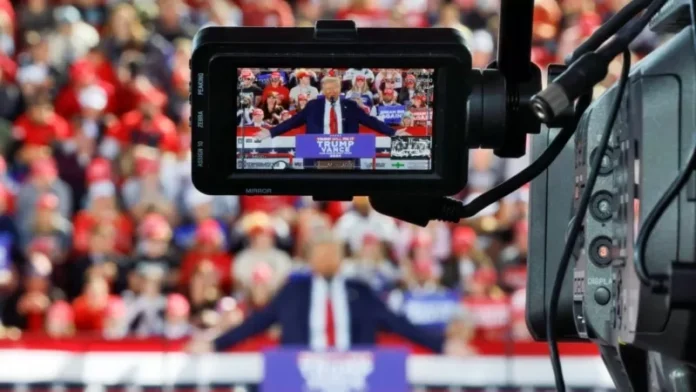Washington – In the final stretch of the U.S. presidential campaign, candidate Donald Trump has once again found himself in the middle of two high-profile legal battles with major news outlets. The former president filed a lawsuit against CBS News and lodged a complaint with the Federal Election Commission (FEC) against The Washington Post newspaper, both for alleged biased coverage against him. These recent actions further showcase Trump’s contentious relationship with the media and raise concerns about press freedom in the United States.
The first case involves an interview of Vice President Kamala Harris by CBS News’ “60 Minutes” program in early October. Trump had originally agreed to give an interview to the network, but backed out at the last minute. The interview with Harris included a question about her stance on the ongoing Israel-Hamas conflict. However, Trump’s lawsuit claims that “60 Minutes” aired two different versions of Harris’ response, and therefore deceiving the viewers.
In response, a CBS spokesperson stated that the interview was not manipulated and that the longer version of Harris’ answer was shown on their program “Face the Nation.” The network also denied Trump’s claims of violating a Texas law against deceptive business practices. The spokesperson further added that the lawsuit has no merit and that they will vigorously defend against it.
In another move, Trump also filed a complaint with the FEC, alleging that The Washington Post provided illegal contributions to the campaign of Vice President Harris. The complaint is based on a social media ad campaign by the Post, highlighting their critical coverage of the former president. According to Trump’s legal team, this constitutes as “illegal corporate in-kind contributions and unreported last-minute independent expenditures.” They also accuse the newspaper of acting as a partisan player in the election process.
However, a spokesperson for The Washington Post refuted these claims, stating that promoted posts on social media are simply a reflection of their high-performing content. They also dismissed the lawsuit as having no merit.
Some experts in the field of press freedom are also skeptical of Trump’s legal actions against these news outlets. Gabe Rottman, policy director at the Reporters Committee for Freedom of the Press, deemed the case against The Washington Post as a “publicity stunt.” He also stated that “advertising by news organizations is a legitimate, routine press function and receives strong First Amendment protections in the courts.”
Despite multiple requests for comment on these legal actions and his overall track record on press freedom, neither Trump’s campaign nor his office provided a response to VOA.
The power to revoke broadcasting licenses has been a recurring threat from Trump, particularly against news outlets that he considers to be biased against him. Throughout his presidency, he has often referred to the media as “the enemy of the people,” and has accused them of being unfair and ideological. He has also openly expressed his desire to punish journalists who decline to reveal confidential sources and has even suggested changing First Amendment protections to allow for the punishment of those who criticize the government.
Furthermore, Trump has previously threatened to revoke CBS’s broadcast license if elected. Even after leaving office, he continued to attack the network on his newly launched social media platform, Truth Social, accusing them of creating the “Greatest Fraud in Broadcast History” and calling for their license to be revoked. He has also targeted other news outlets, such as ABC and NBC, for their coverage of him and threatened to revoke their licenses as well.
In response to these threats, the chair of the Federal Communications Commission, which issues broadcasting licenses, stated that they will not revoke licenses based on a political candidate’s personal disagreements with the content or coverage of a news outlet.
While Trump’s attacks on the media may resonate with his supporters, media analysts warn that they are similar to actions of leaders in countries like Hungary, where the press has been severely undermined.
Clayton Weimers, head of the U.S. office of Reporters Without Borders (RSF), believes that the lawsuit against CBS is merely a publicity stunt. However, he also expressed concern that it reinforces the real threats that Trump has made to use the U.S. government to punish media outlets that criticize him if he returns to the White House.
According to a study conducted by RSF, Trump made at least 2,000 posts on social media that were classified as anti-media during his presidency. Even after leaving office, his anti-media rhetoric has continued, with at least 108 verbal attacks against the media between September and October this year alone.
Furthermore, the recent decisions by The

